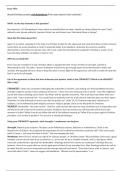Essay Title:
Should Christians practice civil disobedience if the state subverts God’s authority?
WHAT are the key elements in this question?
Key elements: Civil Disobedience/ times when we should follow the state/ should we always follow the state? God’s
authority over human authority. Aquinas: Divine Law and Human Law. God placed those in charge?
What DO YOU think about this?
Agree to an extent. Arguably it is the duty of a Christian to fight for the oppressed and value God above all else, however
surely there are some situations in which it would be better to be obedient, otherwise the outcome could be
detrimental to more than one person. Also, this is not a duty that should just be assigned to Christians, surely, we all
have this duty (whether we believe in God or not).
WHY do you think this?
Even if you do not believe in God, Christian ethics is arguably the best version of ethics in principle, and this is
determined by God. The state, a human institution should never get enough power to be detrimental to ethics and
morality. We arguably all have a duty to keep the state in check, fight for the oppressed, and work to make the state the
best it can be for all people.
Out of the arguments or ideas that have informed your opinion, which is the STRONGEST? Which is the WEAKEST?
Why is this?
STRONGEST: Christ was constantly challenging the authorities in his time, and making sure they benefitted everyone,
and didn’t oppress anyone. Many scriptural references. “I have not come with peace but a sword” “Love thy neighbour”
(surely this means standing up for them) “But Peter and the apostles answered, “We must obey God rather than men.”
(Acts 5:29). “Jesus answered him, “You would have no authority over me at all unless it had been given you from above.
Therefore, he who delivered me over to you has the greater sin” (John 19:11). Powerful argument: references in
scripture, can be followed by both religious and non- religious people, Christ as the blueprint for Christians.
WEAKEST: Bonhoeffer: “No rusty swords”. God first, state second. Idea that we must sometimes act in desperation and
will know the will of God in the moment of action. Problems: how do we know we will know the will of God in the
moment of action? What if we do not follow the will of God without meaning to? What if the act goes against Christian
principles, such as that of pacifism? Too much of a contextual theology?
Using your STRONGEST argument, what strengths / weaknesses can be given.
Strength: Backed up by scripture. His ideas can be followed by anyone, believers or nonbelievers. Christ as the
blueprint for Christians. He recognized the importance of God’s authority and human authority still (“Give unto Caesar
what is Caesar’s, and unto God what is God’s”. Not overstepping the line).
Weakness: Were Christ’s actions too radical for ordinary people, or Christians today? (Reconciliation: Christ sets a good
example, and we do not need to be as extreme e.c.t as he was. He set a valuable example, and is a key figure, which
cannot be undermined or ignored) Are Bonhoeffer’s theology and Christ’s actions too contextual? (Perhaps they are,
however, there is no reason that we cannot apply parts of these to our everyday lives. Their theology/actions are not to
be taken literally, but to be interpreted and the message derived from them). “Give unto Caesar what is Caesar’s, and
unto God what is God’s” seems to suggest civil obedience. “Blessed are the peacemakers” e.c.t.




